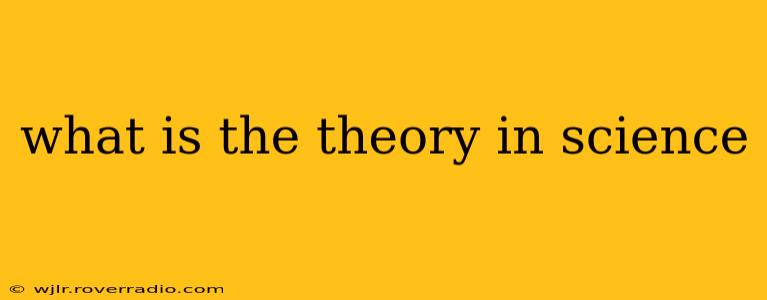The word "theory" in everyday conversation often implies a guess or hunch. However, in science, a theory holds a significantly different and much more substantial meaning. A scientific theory is not merely a speculation; it's a well-substantiated explanation of some aspect of the natural world that can incorporate facts, laws, inferences, and tested hypotheses. It's a robust and comprehensive framework built upon a substantial body of evidence.
What Distinguishes a Scientific Theory from a Hypothesis?
This is a crucial distinction. A hypothesis is a testable prediction or explanation for a specific phenomenon. It's a starting point for scientific investigation. Think of it as an educated guess. For example, a hypothesis might be: "Plants grow taller in sunlight than in shade." This hypothesis can then be tested through experiments.
A theory, on the other hand, is the culmination of extensive research and testing. It's a broader, more encompassing explanation that has withstood rigorous scrutiny and has been supported by a large amount of evidence. It's not simply a collection of facts but a framework that connects and explains those facts. For example, the theory of evolution by natural selection explains the diversity of life on Earth through a mechanism (natural selection) supported by vast amounts of evidence from various fields like genetics, paleontology, and comparative anatomy.
How are Scientific Theories Developed?
The development of a scientific theory is an iterative process:
- Observation: Scientists begin by observing the natural world and identifying patterns or phenomena that require explanation.
- Hypothesis Formulation: Based on observations, scientists formulate testable hypotheses to explain the phenomenon.
- Experimentation and Data Collection: Experiments are designed and conducted to test the hypotheses. Data is meticulously collected and analyzed.
- Analysis and Interpretation: The data is analyzed to determine if it supports or refutes the hypothesis.
- Refinement and Modification: Based on the results, hypotheses are refined, modified, or rejected.
- Theory Formation: If a hypothesis consistently withstands testing and is supported by a large body of evidence, it may eventually evolve into a theory. It's important to note that theories are not static; they are constantly refined and improved as new evidence emerges.
What are some examples of well-established scientific theories?
Numerous well-established scientific theories underpin our understanding of the universe:
- Theory of Gravity: Explains the attraction between objects with mass.
- Theory of Evolution by Natural Selection: Explains the diversity of life on Earth.
- Germ Theory of Disease: Explains that microorganisms cause many diseases.
- Theory of Plate Tectonics: Explains the movement of Earth's lithospheric plates.
- Big Bang Theory: Explains the origin and evolution of the universe.
These theories aren't "just theories" in the casual sense; they are robust explanations supported by mountains of evidence and have revolutionized our understanding of the world.
Can Scientific Theories be Proven?
No, scientific theories cannot be definitively "proven" in the absolute sense. Science operates on the principle of falsification—a theory can be disproven if contradictory evidence is found. However, a theory that has withstood extensive testing and has a strong body of supporting evidence is considered to be highly reliable and accurate. The strength of a scientific theory lies in its explanatory power and its ability to make accurate predictions.
Is there a difference between a law and a theory in science?
Yes, there's a subtle but important distinction. A scientific law describes a phenomenon in nature, often mathematically. It's a concise statement that summarizes observations, but it doesn't necessarily explain why the phenomenon occurs. For instance, Newton's Law of Universal Gravitation describes the force of gravity but doesn't explain what gravity is. A theory, on the other hand, provides a more comprehensive explanation for why a phenomenon occurs. Therefore, laws and theories serve different but complementary roles in science.
Understanding the true meaning of a scientific theory is crucial for comprehending the nature of scientific knowledge and its power to explain the world around us. It's a testament to the rigorous process of scientific inquiry and the accumulation of evidence over time.
